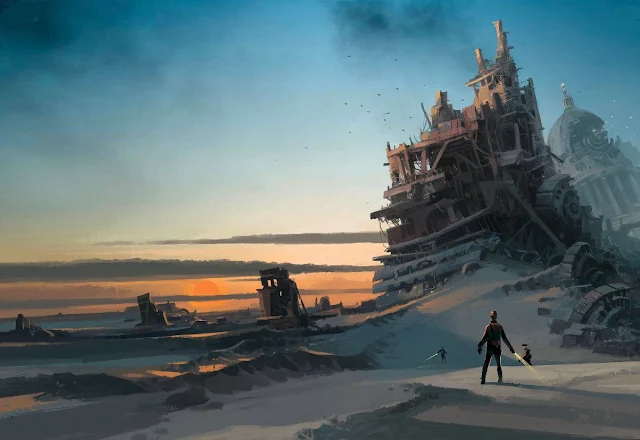Philip Reeve’s A Darkling Plain, the thunderous final chord in the Mortal Engines Quartet, isn't just a book; it’s a full-throated opera of rust, rebellion, and the ragged remnants of humanity clinging to survival. Forget polite post-apocalyptic strolls; Reeve throws you into a world where the philosophy of Municipal Darwinism has reached its bloody, inevitable conclusion. This is where the last stand gets real, the stakes go supernova, and the echoes of roaring engines finally fade into something resembling… peace? Maybe.
The World on the Brink
Picking up months after the gut-punch of Infernal Devices, the world is locked in a final, apocalyptic war. The fanatical Green Storm, led by the terrifying Stalker Fang, has unleashed its war-birds and Stalker armies against the last great Traction Cities of the Traktion-Verband. Their endgame is to capture the orbital weapon ODIN and "re-green" the world by eradicating all human civilization. The novel is a full-on character autopsy, examining what has become of its survivors, Tom Natsworthy, the historian who’s seen too much, and Hester Shaw, the ultimate survivor with a scar that tells a thousand brutal tales.
Tom, now a celebrated pilot, has been drawn into the war, wrestling with choices that would make Machiavelli sweat. Hester, seeking only to protect her family, finds herself and their daughter Wren trapped in the besieged, now-static city of London. Their messed-up, fiercely loyal bond, tested across a continent, remains the beating heart of this whole damn saga.
The Ghost in the Machine
Then there’s The Shrike. Oh, Shrike. What began as a Terminator-esque killing machine evolves into something far more haunting. The reveal of his past, the ghost of Kit Solent trapped inside the chrome and gears, adds a layer of tragic humanity. He becomes a walking embodiment of the question: What does it mean to be human when so much has been stripped away? His final journey in "A Darkling Plain," driven by the last flickering memories of a promise made to Hester, is a masterclass in subverting expectations and a gut-wrenching reminder that even in the darkest of creations, a flicker of a soul can exist.
A World "Swept with Confused Alarms of Struggle"
That title, "A Darkling Plain," isn't just some fancy words. It’s a direct nod to Matthew Arnold’s bleak-as-hell poem, which speaks of a world losing its faith and certainty, where armies clash by night. Sound familiar? Reeve masterfully weaves that same sense of desolate uncertainty into his world. This isn't a shiny, hopeful future; it’s a scarred landscape where ideologies, the ravenous consumption of Municipal Darwinism versus the violent purity of the Green Storm, are the final monsters.
Yet, amidst this gloom, Reeve finds sparks of hope. The endless hunger of the Traction Cities is a brutal metaphor for our own insatiable desires, but the novel dares to ask if a future can be built on the bones of the past without repeating its sins. It’s a mirror held up to our faces, and it ain't pretty.
A Triumph of Storytelling
A Darkling Plain doesn't just conclude the quartet; it detonates a satisfying, if emotionally charged, finale. The action sequences are pure adrenaline, but it’s the quiet moments, the raw human interactions amidst the chaos, that truly resonate. And that ending? Without giving away the farm, let's just say Reeve isn't afraid to twist the knife, leaving you with a lingering sense of both closure and a profound understanding of the sacrifices made.
The accolades this series has garnered are well-deserved. The Guardian Children's Fiction Prize and the Carnegie Medal are not just shiny stickers. They’re recognition of a writer operating on another level. *A Darkling Plain* isn't just a good ending; it's a triumph. It’s a brutal, beautiful, and ultimately hopeful exploration of what it means to be human in a world that’s gone completely off the rails.















